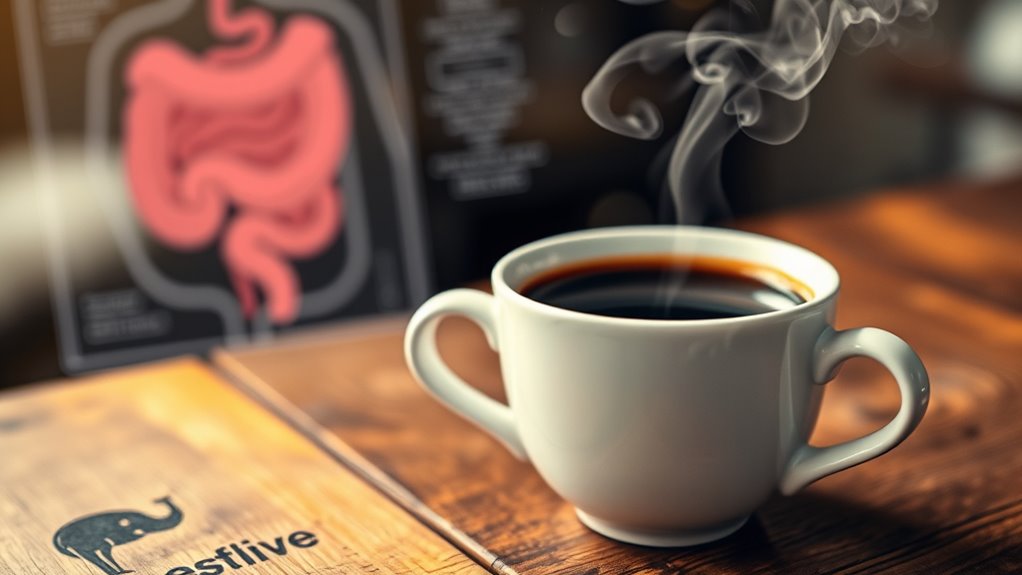Coffee can both support and disrupt your digestion, depending on how much and when you consume it. It contains compounds that boost gut bacteria, aid motility, and promote regular bowel movements, making it beneficial in moderation. However, its acidity and caffeine content can cause discomfort, reflux, or upset sensitive stomachs if overdone. Finding the right balance for your body is key, and exploring further will help you understand how to enjoy coffee without digestive issues.
Key Takeaways
- Coffee’s dietary fiber and polyphenols support beneficial gut bacteria, promoting overall digestion and immune health.
- Caffeine stimulates gut motility, aiding regular bowel movements and reducing constipation risk.
- Excessive coffee intake or high acidity can disrupt gut microbiome balance and cause stomach discomfort.
- Dark roast or low-acid coffee options may be gentler for sensitive stomachs and those prone to reflux.
- Moderation and personal response are key; adjusting coffee type and amount can maximize benefits and minimize drawbacks.

Coffee can influence your digestion in several ways. When you sip your favorite brew, it interacts with your digestive system, impacting gut health and how smoothly your digestive processes run. Coffee contains dietary fiber and polyphenols, which can promote the growth of beneficial gut bacteria. This support for your gut microbiome helps improve digestion overall and may even bolster your immune defenses.
Coffee supports digestion by nourishing beneficial gut bacteria and enhancing overall gut health.
Additionally, caffeine in coffee stimulates intestinal motility, meaning it encourages your intestines to move more efficiently. This effect can help you have regular bowel movements and reduce the chances of constipation, making coffee a potential ally for digestive health in moderation.
However, it’s not all positive. The acidity in coffee, mainly from chlorogenic acids, can increase stomach acid production. For some people, especially those sensitive to acidity, this can cause discomfort or lead to acid reflux, where stomach acid flows back into the esophagus, causing a burning sensation. If you’re prone to acid reflux or have conditions like gastroesophageal reflux disease (GERD), coffee might exacerbate your symptoms.
Dark roast coffees tend to be less acidic because they contain lower levels of chlorogenic acids, so choosing these options might be gentler on your stomach.
Your gut health can be a delicate balance, and excessive coffee intake may tip the scales. Too much caffeine or coffee can disrupt the gut microbiome, potentially reducing beneficial bacteria and promoting inflammation.
For individuals with inflammatory bowel disease (IBD) or irritable bowel syndrome (IBS), overdoing it on coffee might worsen symptoms like bloating, cramping, or diarrhea. Consequently, moderation is key to enjoying coffee without upsetting your digestive harmony.
It’s also worth noting that coffee’s effects on intestinal motility are double-edged. While it can help move things along and prevent constipation, too much stimulation might cause diarrhea or stomach upset in some people.
Understanding your own body’s response is vital. If you notice discomfort, reducing your intake or opting for less acidic brews could make a difference.
Frequently Asked Questions
Is Coffee Good or Bad for Digestion?
You might wonder if coffee helps or hurts your digestion. It can be beneficial, as it contains fiber and antioxidants that promote healthy gut bacteria and stimulate bowel movements, lowering constipation risks.
However, if you’re sensitive to acidity, it could cause discomfort or reflux. For some, excessive coffee may upset their gut balance.
Pay attention to your body’s responses, choose low-acid options, and enjoy coffee in moderation to support your digestion.
Is Coffee a Friend or Foe?
You might wonder if coffee’s a friend or foe to your digestion. It can be beneficial, as it contains antioxidants and fiber that support gut health, and it acts as a natural laxative.
But, if you’re sensitive to acids or caffeine, it could cause irritation or reflux. Pay attention to how your body reacts, choose low-acid options, and enjoy coffee in moderation to determine if it’s a friend or foe for you.
Does Quitting Coffee Improve Digestion?
If you quit coffee, your digestion can improve, especially if you’re sensitive to caffeine or acidity. You might notice fewer symptoms like acid reflux, heartburn, and stomach irritation.
Removing coffee can help restore your gut’s microbial balance and improve gut lining health. However, you may experience temporary changes in bowel movements because you lose coffee’s natural laxative effect.
Is Coffee Inflammatory to the Gut?
You wonder if coffee is inflammatory to your gut. It can be, especially if you’re sensitive, because it boosts stomach acid and contains chlorogenic acids that may cause inflammation.
Dark roast coffee tends to be gentler since it’s less acidic. To minimize issues, try moderating your intake and choosing low-acid varieties.
Pay attention to how your body reacts, and adjust accordingly to keep your digestion calm.
Conclusion
So, whether coffee helps or hinders your digestion depends on your body and how much you drink. If you notice discomfort, it might be time to cut back or switch to gentler options. But if coffee energizes you without issues, enjoy it mindfully. Remember, listening to your body is key. Moderation and awareness will help you find the right balance, making coffee a friend rather than a foe in your digestive journey.









